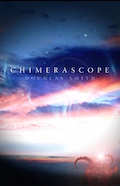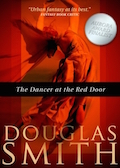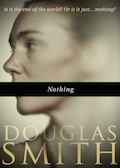Canada’s award winning writer, Douglas Smith, talked with XinXii about his personal experiences in self-publishing. Read about his success strategies and gain precious insights and tips on marketing, cover design or eBook pricing.
About Douglas Smith
Douglas Smith is an award-winning Canadian author whose work has appeared in thirty countries and twenty-five languages. His fiction includes the urban fantasy novel, The Wolf at the End of the World, and the collections Chimerascope, Impossibilia, and La Danse des Esprits. His non-fiction guide for writers, Playing the Short Game: How to Market & Sell Short Fiction, was released in 2014.
Doug is a three-time winner of Canada’s Aurora Award, and has been a finalist for the John W. Campbell Award, CBC’s Bookies Award, Canada’s juried Sunburst Award, and France’s juried Prix Masterton and Prix Bob Morane. A short film based on Doug’s story By Her Hand, She Draws You Down won several awards when it toured film festivals around the world.
His website is www.smithwriter.com and he tweets at twitter.com/smithwritr. Doug maintains the well-known Foreign Market List on his web site, assisting writers to sell their short stories to non-English markets.
1. What are your biggest challenges in your life as an author?
The biggest challenge is making time in my schedule to write. I have a challenging day-job career and a family with a handicapped son, so there are always demands on my time. I tend to write in streaks, which makes it even more difficult since I need to find stretches in my calendar where I can spend time on a project over several days. This is even more critical now that I’m writing novels more than short fiction, since I need to keep myself immersed in the project.
2. How were your book covers created? What is the most important about a good cover for you?
 For my indie covers, I’ve only used professional cover artists. I don’t do my own covers. Erik Mohr, an award-winning Canadian artist, has done most of my covers. Erik also does the covers for ChiZine Publications, a small but growing Toronto publisher who published my second collection, Chimerascope. Erik did such a wonderful job on Chimerascope that I commissioned him when I put out my backlist of short stories as individual ebooks. That was my first foray into indie publishing. I also used Erik for the cover for my recent writer’s guide, Playing the Short Game: How to Market & Sell Short Fiction.
For my indie covers, I’ve only used professional cover artists. I don’t do my own covers. Erik Mohr, an award-winning Canadian artist, has done most of my covers. Erik also does the covers for ChiZine Publications, a small but growing Toronto publisher who published my second collection, Chimerascope. Erik did such a wonderful job on Chimerascope that I commissioned him when I put out my backlist of short stories as individual ebooks. That was my first foray into indie publishing. I also used Erik for the cover for my recent writer’s guide, Playing the Short Game: How to Market & Sell Short Fiction.
Another award-winning Canadian artist, Jean-Pierre Normand, did the cover for my indie published novel, The Wolf at the End of the World. JP had done the cover and interior illustrations back in 2004 for an anthology titled Odyssey that included my story “Jigsaw.” I admired his work on that book so much that I’d always wanted to have him do a cover for me.
 The Argentinean artist, Fernando Molinari, did the cover for my collection, Impossibilia, published by the UK small press, PS Publishing, in 2008. PS published that book only in hardcover. I later indie published both ebook and trade paperback editions and worked with Fernando to reuse his original evocative cover design and artwork.
The Argentinean artist, Fernando Molinari, did the cover for my collection, Impossibilia, published by the UK small press, PS Publishing, in 2008. PS published that book only in hardcover. I later indie published both ebook and trade paperback editions and worked with Fernando to reuse his original evocative cover design and artwork.
Finally, the wonderful Italian artist, Daniel Sera, did the cover for my translated collection, La Danse des Esprits, which was published by Dreampress in France.
For me, a good cover needs to be eye-catching and unusual, with a feel that matches the type of book and genre. Beyond that, I really can’t describe what makes a good cover—which is why I’ve hired professionals to do them for me whenever I’ve indie published.
3. Which criteria define your book prices?
I do not believe in $0.99 books. I will price some of my short story ebooks at that level, but not novels or full collections. I price my ebooks high enough to allow for discounts and sales that many of the ebook distributors will offer on a regular basis. I price my newer books higher than my older ones, usually dropping the price of older books when I release a new one.
4. What is your strategy, that your work becomes a bestseller?
Write the best story that I can, and then when that one is published, write the next book. Most new indie authors make the mistake of rushing out their first book and then spend far too much time promoting it to death. This can only have two possible results. One, their promotion efforts fail, so they’ve wasted time that they should have spent writing their next book. Two, their promotions efforts meet with some success and people buy their book. Those readers will then immediately search for the author’s next book and, of course, won’t find one. Those readers will simply forget that author and move on to another. The author would have been better off investing the time they spent in promotion in writing their next book instead.
5. Besides classic marketing actions, what do you do to boost the success of your book?
As implied above, I don’t spend time much time on promotion, beyond ensuring that readers can find my books. I have a dedicated page for each book on my website, with complete buying links for all the major retail outlets where they are available. I have a mailing list that interested readers can subscribe to, and I’ll announce new books on FB and Twitter.
I take advantage of any marketing opportunities that come my way. I was an author guest recently at the inaugural Toronto International Book Fair, and am a regular guest at local genre conventions and reading series in Toronto.
6. What is your most precious tip for a new indie author?
Focus on improving your craft as a writer, not on promoting yourself. Let your work speak for itself. It’s a numbers game, and the writer with the most good quality books out there will have the best chance.
7. Where do you write? Would you show us your writing place?
I sometimes will write at home office, but I find I’m most productive when I get away. My favourite spot is a local library, which is very modern with lots of wood and glass, with great views of the nearby green spaces. Or a local Starbucks. I find that if I make the effort to go somewhere to write, where there aren’t any distractions, my mind set becomes “Well, I’m here to write, I might as well do that.” Four to five hours is about the right amount for me. More than that, my mind turns to mush, and less than that makes it hard to get a decent word count.
8. With which author would you like to have dinner, and what were your first question?
Most of my choices would be authors who have passed away, sadly. Probably the American SF&F author, Roger Zelazny, who was (is) one of my favourite writers. I’d probably ask him if he could come back and write one more book, what would it be?
9. What is your next project, and what would you do differently compared to your past ones?
I’m currently working on a YA urban fantasy, the first in a planned trilogy. It’s my second novel. With my first novel, I wrote to a detailed outline, since the plot was complicated and I had a large cast of characters and POVs. With this one, I’m finding that I can keep the outline of what scenes I want in my head, plus I have fewer POV characters, so I haven’t done a detailed outline. I’m enjoying writing this one more, both because I learned a lot from the first one, plus it’s more fun to discover the story and the characters as you write as opposed to sketching it out fully in an outline ahead of writing the prose.
I still plan to pitch the book to traditional publishers but will happily indie publish it if I don’t have success with that route or if I can’t negotiate a contract that I’m comfortable with. The contracts from the big publishers have become more and more draconian in recent years, in regards to the rights they request, reversion of those rights, and non-compete restrictions.
10. What do you appreciate in XinXii?
I really appreciate having a single aggregator that allows me to make my books available to European readers via multiple European ebook retailers, retailers that I would otherwise have no access to.
Thank you, Doug, for sharing your experiences. Lots of joy and success on your way as an indie author!
Douglas Smith on XinXii | smithwriter.com | Mailing List
facebook.com/SmithWriter | @smithwritr

No Comments